英语人教版七年级上册学习使用描述性形容词:interesting,boring
人教版-英语-七上-5单元 教材精解
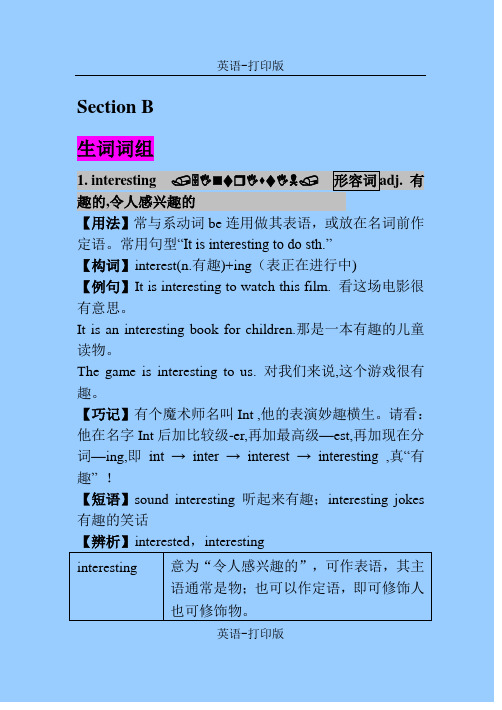
Section B生词词组1. interesting 形容词adj. 有趣的,令人感兴趣的【用法】常与系动词be连用做其表语,或放在名词前作定语。
常用句型“It is interesting to do sth.”【构词】interest(n.有趣)+ing(表正在进行中)【例句】It is interesting to watch this film. 看这场电影很有意思。
It is an interesting book for children.那是一本有趣的儿童读物。
The game is interesting to us. 对我们来说,这个游戏很有趣。
【巧记】有个魔术师名叫Int ,他的表演妙趣横生。
请看:他在名字Int后加比较级-er,再加最高级—est,再加现在分词—ing,即int → inter → interest → interesting ,真“有趣” !【短语】sound interesting 听起来有趣;interesting jokes 有趣的笑话【辨析】interested,interestinginteresting 意为“令人感兴趣的”,可作表语,其主语通常是物;也可以作定语,即可修饰人也可修饰物。
英语-打印版Interested 意为“感兴趣的”,常用于“be/becomeinterested in”这一结构,主语通常是人。
2. boring 形容词adj. 无聊的;令人生厌的【用法】作形容词,意为“令人生厌的”。
在句中,主语常常是物或事情,在句中作表语或定语。
【例句】The film is boring。
这部电影很无聊。
It is boring to talk with him. 和他谈话简直太乏味了。
【短语】a boring film 一部让人讨厌的电影【辨析】boring 与bored 的区别boring为形容词,意为“无聊的,令人厌烦的,令人讨厌的”,指事物本身的特征或性质,常用物做主语。
人教版七年级英语上册知识点归纳
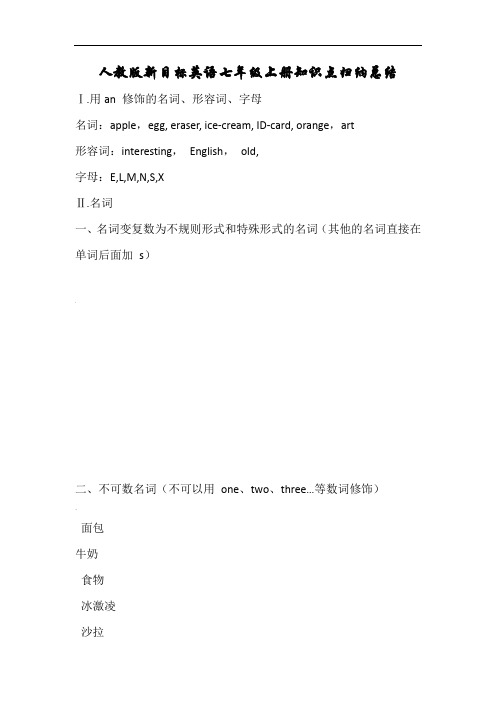
人教版新目标英语七年级上册知识点归纳总结Ⅰ.用an 修饰的名词、形容词、字母名词:apple,egg, eraser, ice-cream, ID-card, orange,art形容词:interesting,English,old,字母:E,L,M,N,S,XⅡ.名词一、名词变复数为不规则形式和特殊形式的名词(其他的名词直接在单词后面加s),二、不可数名词(不可以用one、two、three…等数词修饰)、面包牛奶食物冰激凌沙拉鸡肉Ⅲ.疑问句一、一般疑问句及其答语,1. - Is he Jack –Yes , he is.\ No, he isn’t. His name’s Mike you Helen –Yes, I am\ No, it isn’t. I’m Gina.3. -Is this\that your pencil –Yes, it is .\No, it isn’t. It’s hers. these\those your books -Yes, they are.\No, they aren’t. They’re mine you have a soccer ball –Yes, I do\ No, I don’t.she have a basketball –Yes ,she does.\ No, she does n’tyou like bananas –Yes ,I do.\No. I don’t.she like tomatoes – Yes, she does\No, she doesn’t二、…三、特殊疑问句及其答语’s this\that in English –It’s\It is …color is it –It’s\It is …his \her name –He’s Eric\She’s Mary.’s she –she is…’re\Who are they –They’re…’s my schoolbag –It’s on\under\in …are their keys –They’re on\in\under …#much is the hat –It’s five dollars.much are these socks –They’re two dollars.is your birthday –My birthday is on\in… I t’s on\in…’s Mary’s favorite subject –Her favorite subject is science.does Bob like history -Because it’s interesting.do Frank and Bob like . –Because it’s fun.is your music teacher –My music teacher is …Ⅳ.物主代词(名词性物主代词,形容词性物主代词)一、/二、名词性物主代词:mine, yours, his, hers, theirs,ours.(这些词后面没有名词)三、形容词性物主代词:my, your, his, her,their,our.(这些词后面一定有名词)Ⅴ.词组和固定搭配pair of 一双,一对set of 一套,一串,一副…for…请求,恳求(给予)I help you (我能帮助您吗)on.(快点!加油!)name (名字)name(姓)sure(无疑,肯定)…to… (从…到…)a good day!=have a good time!过得愉快~you are 给你about…=What about……怎么样much is\are……多少钱old is\are……几岁English 用英语school 中学you!再见~you for…为…而感谢你about…考虑,思考TV 看电视’re welcome 别客气~is\are +名词单数\名词复数这是\这些是the first photo 在第一张相片里the next picture 在下一张照片里name of …=one’s name…的名字+动词原形必须做某事sb at +邮箱地址发邮件给某人sb. 给某人打电话Call+ 号码拨打某号码call sb at + 号码给某人打电话拨某号码sth. with sb. 和某人玩…sb. about sth. 询问某人关于某事.+in+颜色=颜色+n.某种颜色的某物busy with\doing sth.忙某事\忙于做某事trip 学校郊游festival 艺术节a great sale大减价.a good price 以合理的价格class\school 课下\放学后Ⅵ.同义句1.how much is \are…= what’s the price of…2.What’s one’s favorite subject= what subject do\does best(。
Unit 5 单元知识速记 -2024-2025学年七年级上册英语核心知识归纳精练一遍过(人教新目标

Unit 5单元知识速记词汇精讲1.interesting&interested这两个词都是形容词。
interesting表示某物本身有趣,强调主动,在句子中可以作定语、表语,多用来修饰物。
interested着重于被动意义,其主语一般是人。
常做表语,后接介词in,一起构成be interested in…结构,意为“对……感兴趣”。
例如: I am very interested in the interesting story. 我对这个有趣的故事很感兴趣。
2.difficultdifficult“困难的”,相当于hard。
在句子中可作定语或者表语。
其反义词是easy“容易的”。
其名词形式是difficulty。
常用于以下结构:It’s difficult for sb. to do sth. (对某人来说做某事很困难。
)例如:It’s difficult for me to listen to you clearly. 对我来说听清楚你说话很难。
3.greatgreat 形容词,意为“美妙的,大的,伟大的”。
例如:That’s great! 太好了!He’s a great man. 他是个伟大的人。
4.watchwatch作动词时,意为“看”。
一般指看动态的东西,例如:节目、比赛等。
动词短语“看电视”用“watch TV”。
watch 还可以指认真观察,或者目睹事情的全过程。
例如:I watched my son become from a baby to a boy.我看到我的儿子从婴儿变成了男孩儿。
Just watch what will happen when I press the button.看着, 我按按钮会发生什么事情。
watch 还可以作名词,意为“手表”。
例如:My father bought me a new watch. 我爸爸给我买了块新表。
注意:watch与see,look,read的区别look意为“看”,指看的动作。
七年级下册英语重点单词用法归纳
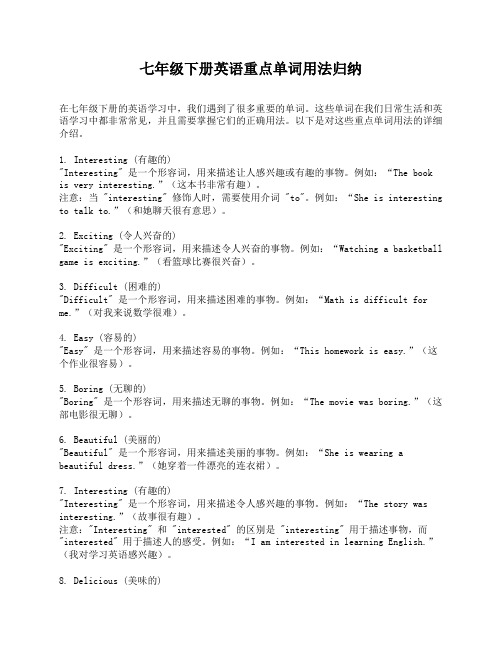
七年级下册英语重点单词用法归纳在七年级下册的英语学习中,我们遇到了很多重要的单词。
这些单词在我们日常生活和英语学习中都非常常见,并且需要掌握它们的正确用法。
以下是对这些重点单词用法的详细介绍。
1. Interesting (有趣的)"Interesting" 是一个形容词,用来描述让人感兴趣或有趣的事物。
例如:“The book is very interesting.”(这本书非常有趣)。
注意:当 "interesting" 修饰人时,需要使用介词 "to"。
例如:“She is interesting to talk to.”(和她聊天很有意思)。
2. Exciting (令人兴奋的)"Exciting" 是一个形容词,用来描述令人兴奋的事物。
例如:“Watching a basketball game is exciting.”(看篮球比赛很兴奋)。
3. Difficult (困难的)"Difficult" 是一个形容词,用来描述困难的事物。
例如:“Math is difficult for me.”(对我来说数学很难)。
4. Easy (容易的)"Easy" 是一个形容词,用来描述容易的事物。
例如:“This homework is easy.”(这个作业很容易)。
5. Boring (无聊的)"Boring" 是一个形容词,用来描述无聊的事物。
例如:“The movie was boring.”(这部电影很无聊)。
6. Beautiful (美丽的)"Beautiful" 是一个形容词,用来描述美丽的事物。
例如:“She is wearing a beautiful dress.”(她穿着一件漂亮的连衣裙)。
7. Interesting (有趣的)"Interesting" 是一个形容词,用来描述令人感兴趣的事物。
人教版七年级英语上册期末复习:Units5-9_词汇句型精讲精练
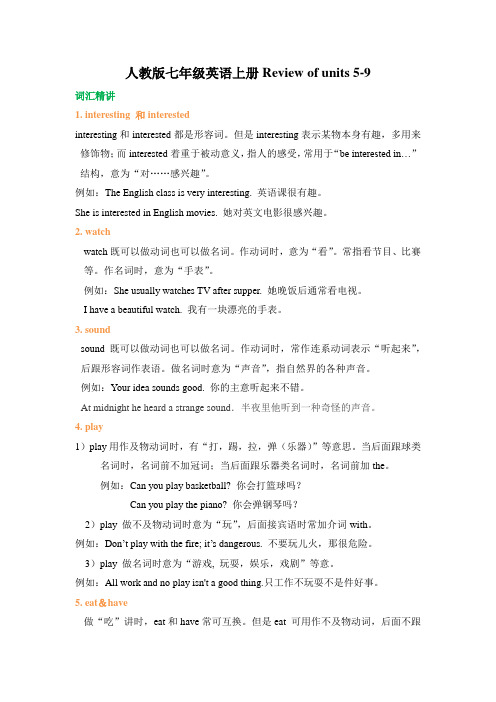
人教版七年级英语上册Review of units 5-9词汇精讲1. interesting 和interestedinteresting和interested都是形容词。
但是interesting表示某物本身有趣,多用来修饰物;而interested着重于被动意义,指人的感受,常用于“be interested in…”结构,意为“对……感兴趣”。
例如:The English class is very interesting. 英语课很有趣。
She is interested in English movies. 她对英文电影很感兴趣。
2. watchwatch既可以做动词也可以做名词。
作动词时,意为“看”。
常指看节目、比赛等。
作名词时,意为“手表”。
例如:She usually watches TV after supper. 她晚饭后通常看电视。
I have a beautiful watch. 我有一块漂亮的手表。
3. soundsound既可以做动词也可以做名词。
作动词时,常作连系动词表示“听起来”,后跟形容词作表语。
做名词时意为“声音”,指自然界的各种声音。
例如:Your idea sounds good. 你的主意听起来不错。
At midnight he heard a strange sound.半夜里他听到一种奇怪的声音。
4. play1)play用作及物动词时,有“打,踢,拉,弹(乐器)”等意思。
当后面跟球类名词时,名词前不加冠词;当后面跟乐器类名词时,名词前加the。
例如:Can you play basketball? 你会打篮球吗?Can you play the piano? 你会弹钢琴吗?2)play 做不及物动词时意为“玩”,后面接宾语时常加介词with。
例如:Don’t play with the fire; it’s dangerous. 不要玩儿火,那很危险。
初中英语新人教版七年级上册Unit4Section B课文讲解(2024秋)

七年级英语上册Unit4 SB课文讲解1.I’m a student in Canada. 我是加拿大的学生。
【用法详解】In Canada在此处作后置定语修饰前面的student,译为“加拿大的学生”。
“In + 国家”表示“在某个国家”Eg: in China 在中国; in America 在美国【知识拓展】作后置定语的五种形式(1)形容词作后置定语: Eg: the girl asleep 正在熟睡的女孩(2)副词作后置定语: Eg: students here 这的学生(3)介词短语作后置定语 Eg: the man with glasses 戴眼镜的人(4)动词不定式作后置定语 Eg: the key to success 成功的关键(5)分词作后置定语 Eg: the girl sitting next to me 坐在我旁边的女孩【即学即用】( B )1.The girl _______ England is our new classmate.A.is fromB.fromes fromD.are from2.I’m very busy this year. 我今年很忙。
【用法详解】busy为形容词,译为“繁忙的;忙碌的”,在句中常作定语或表语。
常见搭配:be busy with sth.= be busy doing sth. 忙于做某事Eg: My mum is busy with dinner.= My mum is busy cooking dinner. 我妈妈正忙着做晚饭。
【知识拓展】Busy反义词为free,译为“空闲的”,free也可译为“免费的;自由的”等。
Eg: I’m free today. 我今天有空。
The cake is free. 这块蛋糕是免费的。
This is a free country. 这是一个自由的国家。
【即学即用】( B )1.The students are busy _______ for the coming exam.A.prepareB.preparingC.to prepareD.to preparing.3.He lets us play all kinds of interesting instruments. 他让我们演奏各种各样有趣的乐器。
(完整版)人教版初中英语各单元形容词知识点汇总表
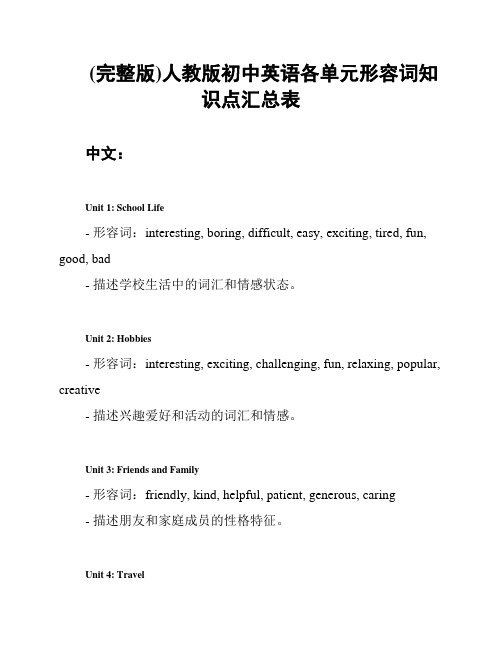
(完整版)人教版初中英语各单元形容词知识点汇总表中文:Unit 1: School Life- 形容词:interesting, boring, difficult, easy, exciting, tired, fun, good, bad- 描述学校生活中的词汇和情感状态。
Unit 2: Hobbies- 形容词:interesting, exciting, challenging, fun, relaxing, popular, creative- 描述兴趣爱好和活动的词汇和情感。
Unit 3: Friends and Family- 形容词:friendly, kind, helpful, patient, generous, caring- 描述朋友和家庭成员的性格特征。
Unit 4: Travel- 形容词:beautiful, stunning, amazing, breathtaking, crowded, peaceful, memorable- 描述旅行目的地和景点的词汇和情感。
Unit 5: Food and Health- 形容词:delicious, healthy, tasty, fresh, nutritious, spicy, sweet, salty- 描述食物和健康的词汇和情感。
Unit 6: Environment- 形容词:clean, polluted, green, beautiful, natural, crowded, peaceful, noisy- 描述环境和地区的词汇和情感。
Unit 7: Daily Routine- 形容词:busy, productive, tiring, relaxing, regular, organized- 描述日常生活和活动的词汇和情感。
Unit 8: Festivals and Celebrations- 形容词:joyful, festive, exciting, cultural, traditional, meaningful, colorful- 描述节日和庆典的词汇和情感。
最新人教版七年级英语上册单词、音标、词性、词义
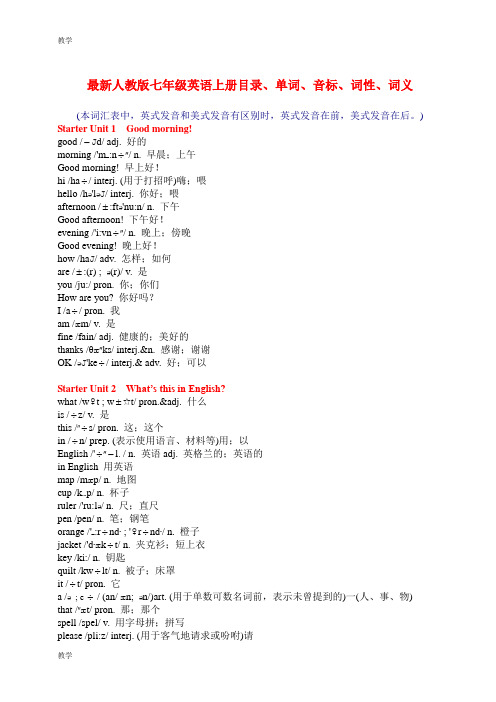
最新人教版七年级英语上册目录、单词、音标、词性、词义(本词汇表中,英式发音和美式发音有区别时,英式发音在前,美式发音在后。
) Starter Unit 1 Good morning!good / J d/ adj. 好的morning /'m :n / n. 早晨;上午Good morning! 早上好!hi /ha / interj. (用于打招呼)嗨;喂hello /hə'ləJ/ interj. 你好;喂afternoon / :ftə'nu:n/ n. 下午Good afternoon! 下午好!evening /'i:vn / n. 晚上;傍晚Good evening! 晚上好!how /ha J/ adv. 怎样;如何are / :(r) ; ə(r)/ v. 是you /ju:/ pron. 你;你们How are you? 你好吗?I /a / pron. 我am /æm/ v. 是fine /fain/ adj. 健康的;美好的thanks /θæ ks/ interj.&n. 感谢;谢谢OK /əJ'ke / interj.& adv. 好;可以Starter Unit 2 What’s this in English?what /w t ; w t/ pron.&adj. 什么is / z/ v. 是this / s/ pron. 这;这个in / n/ prep. (表示使用语言、材料等)用;以English /' l / n. 英语adj. 英格兰的;英语的in English 用英语map /mæp/ n. 地图cup /k p/ n. 杯子ruler /'ru:lə/ n. 尺;直尺pen /pen/ n. 笔;钢笔orange /' :r nd ; ' r nd / n. 橙子jacket /'d æk t/ n. 夹克衫;短上衣key /ki:/ n. 钥匙quilt /kw lt/ n. 被子;床罩it / t/ pron. 它a /ə; e / (an/ æn; ən/)art. (用于单数可数名词前,表示未曾提到的)一(人、事、物) that / æt/ pron. 那;那个spell /spel/ v. 用字母拼;拼写please /pli:z/ interj. (用于客气地请求或吩咐)请Starter Unit 3 What color is it?color /'k lə/ n. (=colour) 颜色red /red/ adj.& n. 红色(的)yellow /'jeləJ/ adj.& n. 黄色(的)green / ri:n/ adj.& n. 绿色(的)blue /blu:/ adj.& n. 蓝色(的)black /blæk/ adj.& n. 黑色(的)white /wa t/ adj.& n. 白色(的)purple /'p3:pl/ adj.& n. 紫色(的)brown /bra J n/ adj.& n. 棕色(的);褐色(的)the / ; ə/ art. 指已提到或易领会到的人或事物now /na J/ adv. 现在;目前see /si:/ v. 理解;明白can /kæn;kən/ modal v. 能;会say /se / v. 说;讲my /ma / pron. 我的Unit 1 My name’s Gina.name /ne m/ n. 名字;名称nice /na s/ adj. 令人愉快的;宜人的to /tu:tə/常用于原形动词之前,表示该动词为不定式meet /mi:t/ v. 遇见;相逢too /tu:/ adv. 也;又;太your /j :/ pron. 你的;你们的Ms. /m z/ (用于女子的姓氏或姓名前,不指明婚否)女士his /h z/ pron. 他的and /ænd ; ənd/ conj. 和;又;而her /h3:(r)/ pron, 她的yes /jes/ interj. 是的;可以she / i:/ pron. 她he /hi:/ pron. 他no /nəJ/ interj. 不;没有;不是not /n t ; n t/ adv. 不;没有zero /'z ərəJ ; 'z rəJ/ num. 零one /w n/ num. 一two /tu:/ num. 二three /θri:/ num. 三four /f :/ num. 四five /fa v/ num. 五six /s ks/ num. 六seven /'sevn/ num. 七eight /e t/ num. 八nine /na n/ num. 九telephone /'tel fəJ n/ n. 电话;电话机number /'n mbə/ n. 号码;数字phone /fəJ n/ n. 电话;电话机telephone/phone number 电话号码first /f3:st/ adj. 第一first name 名字last /l :st ; læst/ adj. 最后的;末尾的last name 姓friend /frend/ n. 朋友China /'t a nə/ 中国middle /'m dl/ adj. 中间的;中间school /sku:l/ n. 学校middle school 中学;初中Unit 2 This is my sister.sister /'s stə/ n. 姐;妹mother /'m ə/ n. 母亲;妈妈father /'fa: ə/ n. 父亲;爸爸parent /'peərənt/ n. 父(母)亲brother /'br ə/ n. 兄;弟grandmother /' rænm ə/ n. (外)祖母;奶奶;外婆;姥姥grandfather /' rænf : ə/ n. (外)祖父;爷爷;外公;姥爷grandparent /' rænpeərənt/ n. 祖父(母);外祖父(母)family /'fæməli/ n. 家;家庭those / əJ z/ pron. 那些who /hu:/ pron. 谁;什么人oh /əJ/ interj. 哦;啊these / i:z/ pron. 这些they / e / pron. 他(她、它)们well /wel/ interj. 嗯;好吧have /hæv/ v. 经受;经历day /de / n.一天;一日;白天Have a good day! (表示祝愿)过得愉快!bye /ba / interj. (=goodbye)再见son /s n/ n. 儿子cousin /'k zn/ n. 堂兄(弟、姊、妹);表兄(弟、姊、妹)grandpa /' rænp :/ n. (外)祖父;爷爷;外公;姥爷mom /m m/, /m :m/ n. (=mum)妈妈aunt / :nt ; nt/ n. 姑母;姨母;伯母;婶母;舅母grandma /' rænm :/ n.(外)祖母;奶奶;外婆;姥姥dad /dæd/ n. 爸爸uncle /' kl/ n. 舅父;叔父;伯父;姑父;舅父daughter /'d :tə/ n. 女儿here /h ə/ adv. (用以介绍某人或某物)这就是;在这里photo /'fəJ təJ/ n. 照片of / v, əv/ prep. 属于(某人或某物);关于(某人或某物) next /nekst/ adj.&n. 下一个(的);接下来(的)picture /'p kt ə/ n. 照片;图画girl / 3:l/ n. 女孩dog /d ; d :g/ n. 狗Unit 3 Is this your pencil?pencil /'pensl/ n. 铅笔book /b J k/ n. 书eraser / 're zə/ n. 橡皮box /b ks ; b ks/ n. 箱;盒pencil box 铅笔盒;文具盒schoolbag /'sku:lb / n. 书包dictionary /'d k ənri ; 'd k əneri/ n. 词典;字典his /h z/ pron. 他的mine /ma n/ pron. 我的hers /h3:z/ pron. 她的excuse / k'skju:z/ v. 原谅;宽恕me /mi:/ pron. (I的宾格)我excuse me 劳驾;请原谅thank /θæ k/ v. 感谢;谢谢teacher /'ti:t ə(r)/ n. 老师;教师about //ə'ba J t/ prep. 关于What about...?(询问消息或提出建议)......怎么样?......好吗?yours /j :z/ pron. 你的;你们的for /f :(r) ; /fə(r) / prep. 为了;给;对thank you for... 为......而感谢help /help/ v.&n. 帮助;援助welcome /'welkəm/ adj. 受欢迎的You're welcome. 别客气。
- 1、下载文档前请自行甄别文档内容的完整性,平台不提供额外的编辑、内容补充、找答案等附加服务。
- 2、"仅部分预览"的文档,不可在线预览部分如存在完整性等问题,可反馈申请退款(可完整预览的文档不适用该条件!)。
- 3、如文档侵犯您的权益,请联系客服反馈,我们会尽快为您处理(人工客服工作时间:9:00-18:30)。
Section B
教学目标
知识与能力
Section B的主要内容是学会使用描述性形容词,复习和巩固所学的知识,并学会运用所学知识进行写作(行为动词一般现在时的肯定句、否定句和一般疑问句)。
过程与方法运用Classifying的学习策略,引导学生进行听力和口语交际训练,学会使用do和does引导的一般疑问句,学会用Let’s…提建议,并能够谈论自己喜欢哪些球类运动、不喜欢哪些球类运动及其原因,能够谈论怎样和自己的朋友度过一段愉快的时光,同时也进行适当的阅读和写作练习(主要是组词、造句)。
情感态度价值观
该部分学习内容主要是谈论自己喜欢哪些球类运动,不喜欢哪些球类运动及其原因,符合学生喜爱运动的心理,同时通过谈论怎样和自己的朋友度过一段愉快的时光,培养同学之间和睦相处,互相帮助,团结友爱的精神。
教学重、难点及教学突破
重点
学习使用描述性形容词:interesting,boring,fun,difficult,relaxing:复习do/does引导的一般疑问句和let’s…句型;复习名词的复数构成与使用。
语法难点
行为动词一般现在时的肯定句、否定句的结构,尤其是单三形式的变化。
教学突破
复习和巩固所学的行为动词一般现在时的结构,引导学生进行一些阅读和写作的练习,对强化记忆有很大的帮助。
教学准备
教师准备
设计学生常见的球类运动和其它活动的教学幻灯片,图片或制作反映各种运动活动的课件;设计课后巩固练习的幻灯片。
学生准备
通过询问老师、同学或上网查询的方式了解各种运动的竞赛方法;调查同学、朋友或家人所喜欢的运动项目及其原因。
教学步骤
(1课时)
一、第一教学环节:情景创设,导入新课
二、第二教学环节:师生互动。
学习探究
三、第三教学环节:合作交流,巩固提高
本课总结
本课内容主要学习使用描述性形容词:interesting,boring,fun,difficult,relaxing;
复习do/does引导的一般疑问句和let’s…句型;复习名词的复数构成与使用。
正确掌握行为动词一般现在时的肯定句、否定句的结构,尤其是单三形式的变化,并进行阅读和写作的练习。
板书设计
Unit 5 Do you have a soccer ball?
Section B
Words: interesting, boring, fun, difficult, relaxing
play volleyball /basketball, watch TV, a sports collection, every day
have→has, but →and, only, them→they
Sentences: Let’s play computer games. That sounds interesting.
Grammar: 行为动词一般现在时的肯定句、否定句构成:
He has 7 tennis rackets. He doesn’t play sports.
问题探究与拓展活动
Let’s祈使句的构成和用法:基本构成是Let+someone+d o something.,意思是“让某人做某事”,表示“征求意见或提出建议”。
如:Let’s play basketball.让我们打篮球吧。
,It’s time for class.Let’s g o t o the c lass r oom.上课了,让我们去教室吧。
实践活动,做调查:调查学生喜欢什么球类运动?不喜欢什么球类运动?为什么?在活动开展之前,教师要在黑板上画一个表完成,即让学生自己说出喜欢什么,不喜欢什么,最后说出理由。
教师可将学生的答案填在表格中,再进行归类。
这种活动可使同学们学会表示描述性形容词的用法。
练习设计
随堂练习设计
仔细观察下表中各句的规律,选用have,do的适当形式填空。
KEY S:1.have;do;don’t 2.Does;have;does;doesn’t 3.Do;have;have 4.Does;has 5.have;have 6.have;don’t
个性练习设计
谈论自己在体育方面的爱好、兴趣及原因:无论是男生还是女生,对体育的爱好是一种共性,但每个人的爱好是不相同的。
让学生谈论自己在体育方面的爱好、兴趣是他们愿意做的事情,进一步要求学生说出自己对某项运动感兴趣的原因。
学生可以这样介绍:I like basketball.I have a basketball.I like it,because it’s interesting.。
这种活动可以帮助学生更好地使用描述性形容词,也可以了解和掌握学生在体育方面的爱好。
